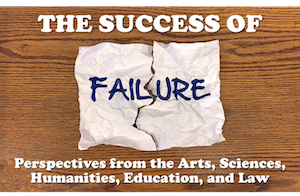The event recording is available via YouTube.
We are all familiar with the many bromides teaching us the value of failure on the path to success. It builds character, shows perseverance and dedication, demonstrates willingness to take a risk, and so forth. All perhaps true, but all constrained by a view of failure as a means to an end, an unfortunately necessary obstacle to be overcome. One may learn from failures, but what is mostly meant is that one learns not to do that particular thing again. Failing is fine, especially on someone else’s dime, if you gain some experience to avoid future failures.
We take here an alternative view of failure. What about failure as a good? What about the intrinsic value of failure? How about failure that contains valuable data, not just an error message? Failure that is a critical part of the process, not a means to an end? Failure that stands shoulder to shoulder with success? Can there be such a thing as positive failure? Can failure make progress? Can we use failure to improve creativity, education, or behavior? How do we research failure? How do we discover important failures? How do we recognize important failures? This symposium will investigate these and other perspectives on failure across disciplines, searching for commonalities and differences.

